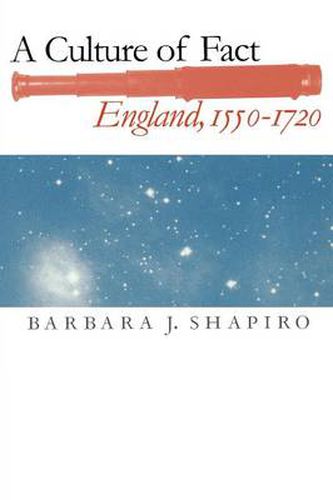Readings Newsletter
Become a Readings Member to make your shopping experience even easier.
Sign in or sign up for free!
You’re not far away from qualifying for FREE standard shipping within Australia
You’ve qualified for FREE standard shipping within Australia
The cart is loading…






Barbara J. Shapiro traces the surprising genesis of the fact , a modern concept that, she demonstrates, originated not in natural science, but in legal discourse. She follows the concept’s evolution and diffusion across a variety of disciplines in early modern England, examining how the emerging culture of fact shaped the epistemological assumptions of each intellectual enterprise. Drawing on an astonishing breadth of research, Shapiro probes the fact’s changing identity from an alleged human action to a proven natural or human happening. The crucial first step in this transition occurred in the 16th century when English common law established a definition of fact which relied on eyewitnesses and testimony. The concept widened to cover natural as well as human events as a result of developments in news reportage and travel writing. Only then, Shapiro discovers, did scientific philosophy adopt the category fact . With Francis Bacon advocating more stringent criteria, the witness became a vital component in scientific observation and experimentation. Shapiro also recounts how England’s preoccupation with the fact influenced historiography, religion and literature - which saw the creation of a fact-oriented fictional genre, the novel.
$9.00 standard shipping within Australia
FREE standard shipping within Australia for orders over $100.00
Express & International shipping calculated at checkout
Barbara J. Shapiro traces the surprising genesis of the fact , a modern concept that, she demonstrates, originated not in natural science, but in legal discourse. She follows the concept’s evolution and diffusion across a variety of disciplines in early modern England, examining how the emerging culture of fact shaped the epistemological assumptions of each intellectual enterprise. Drawing on an astonishing breadth of research, Shapiro probes the fact’s changing identity from an alleged human action to a proven natural or human happening. The crucial first step in this transition occurred in the 16th century when English common law established a definition of fact which relied on eyewitnesses and testimony. The concept widened to cover natural as well as human events as a result of developments in news reportage and travel writing. Only then, Shapiro discovers, did scientific philosophy adopt the category fact . With Francis Bacon advocating more stringent criteria, the witness became a vital component in scientific observation and experimentation. Shapiro also recounts how England’s preoccupation with the fact influenced historiography, religion and literature - which saw the creation of a fact-oriented fictional genre, the novel.